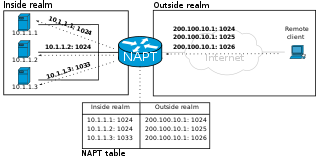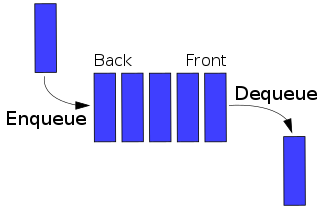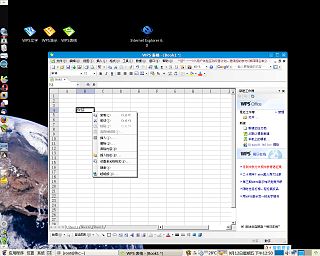In computing, a device driver is a computer program that operates or controls a particular type of device that is attached to a computer. A driver provides a software interface to hardware devices, enabling operating systems and other computer programs to access hardware functions without needing to know precise details about the hardware being used.
In computing, the Windows Sockets API (WSA), later shortened to Winsock, is a technical specification that defines how Windows network software should access network services, especially TCP/IP. It defines a standard interface between a Windows TCP/IP client application and the underlying TCP/IP protocol stack. The nomenclature is based on the Berkeley sockets API model used in BSD for communications between programs.

In computer networking, port forwarding or port mapping is an application of network address translation (NAT) that redirects a communication request from one address and port number combination to another while the packets are traversing a network gateway, such as a router or firewall. This technique is most commonly used to make services on a host residing on a protected or masqueraded (internal) network available to hosts on the opposite side of the gateway, by remapping the destination IP address and port number of the communication to an internal host.
iptables is a user-space utility program that allows a system administrator to configure the IP packet filter rules of the Linux kernel firewall, implemented as different Netfilter modules. The filters are organized in different tables, which contain chains of rules for how to treat network traffic packets. Different kernel modules and programs are currently used for different protocols; iptables applies to IPv4, ip6tables to IPv6, arptables to ARP, and ebtables to Ethernet frames.
Netfilter is a framework provided by the Linux kernel that allows various networking-related operations to be implemented in the form of customized handlers. Netfilter offers various functions and operations for packet filtering, network address translation, and port translation, which provide the functionality required for directing packets through a network and prohibiting packets from reaching sensitive locations within a network.

Linux Virtual Server (LVS) is load balancing software for Linux kernel–based operating systems.
Veritas Cluster Server is a high-availability cluster software for Unix, Linux and Microsoft Windows computer systems, created by Veritas Technologies. It provides application cluster capabilities to systems running other applications, including databases, network file sharing, and electronic commerce websites.
In computer networking, STREAMS is the native framework in Unix System V for implementing character device drivers, network protocols, and inter-process communication. In this framework, a stream is a chain of coroutines that pass messages between a program and a device driver. STREAMS originated in Version 8 Research Unix, as Streams.

ipfirewall or ipfw is a FreeBSD IP, stateful firewall, packet filter and traffic accounting facility. Its ruleset logic is similar to many other packet filters except IPFilter. ipfw is authored and maintained by FreeBSD volunteer staff members. Its syntax enables use of sophisticated filtering capabilities and thus enables users to satisfy advanced requirements. It can either be used as a loadable kernel module or incorporated into the kernel; use as a loadable kernel module where possible is highly recommended. ipfw was the built-in firewall of Mac OS X until Mac OS X 10.7 Lion in 2011 when it was replaced with the OpenBSD project's PF. Like FreeBSD, ipfw is open source. It is used in many FreeBSD-based firewall products, including m0n0wall and FreeNAS. A port of an early version of IPFW was used since Linux 1.1 as the first implementation of firewall available for Linux, until it was replaced by ipchains. A modern port of ipfw and the dummynet traffic shaper is available for Linux and Microsoft Windows. wipfw is a Windows port of an old (2001) version of ipfw.
The Netlink socket family is a Linux kernel interface used for inter-process communication (IPC) between both the kernel and userspace processes, and between different userspace processes, in a way similar to the Unix domain sockets. Similarly to the Unix domain sockets, and unlike INET sockets, Netlink communication cannot traverse host boundaries. However, while the Unix domain sockets use the file system namespace, Netlink processes are usually addressed by process identifiers (PIDs).

NuFW is a software package that extends Netfilter, the Linux kernel-internal packet filtering firewall module. NuFW adds authentication to filtering rules. NuFW is also provided as a hardware firewall, in the EdenWall firewalling appliance. NuFW has been restarted by the FFI and renamed into UFWI.
In computing, Microsoft's Windows Vista and Windows Server 2008 introduced in 2007/2008 a new networking stack named Next Generation TCP/IP stack, to improve on the previous stack in several ways. The stack includes native implementation of IPv6, as well as a complete overhaul of IPv4. The new TCP/IP stack uses a new method to store configuration settings that enables more dynamic control and does not require a computer restart after a change in settings. The new stack, implemented as a dual-stack model, depends on a strong host-model and features an infrastructure to enable more modular components that one can dynamically insert and remove.

nftables is a subsystem of the Linux kernel providing filtering and classification of network packets/datagrams/frames. It has been available since Linux kernel 3.13 released on 19 January 2014.

ngrep is a network packet analyzer written by Jordan Ritter. It has a command-line interface, and relies upon the pcap library and the GNU regex library.

netsniff-ng is a free Linux network analyzer and networking toolkit originally written by Daniel Borkmann. Its gain of performance is reached by zero-copy mechanisms for network packets, so that the Linux kernel does not need to copy packets from kernel space to user space via system calls such as recvmsg. libpcap, starting with release 1.0.0, also supports the zero-copy mechanism on Linux for capturing (RX_RING), so programs using libpcap also use that mechanism on Linux.
Traffic classification is an automated process which categorises computer network traffic according to various parameters into a number of traffic classes. Each resulting traffic class can be treated differently in order to differentiate the service implied for the data generator or consumer.

A network scheduler, also called packet scheduler, queueing discipline, qdisc or queueing algorithm, is an arbiter on a node in packet switching communication network. It manages the sequence of network packets in the transmit and receive queues of the network interface controller. There are several network schedulers available for the different operating systems, that implement many of the existing network scheduling algorithms.

Open vSwitch, sometimes abbreviated as OVS, is an open-source implementation of a distributed virtual multilayer switch. The main purpose of Open vSwitch is to provide a switching stack for hardware virtualization environments, while supporting multiple protocols and standards used in computer networks.

Longene is a Linux-based operating system kernel intended to be binary compatible with application software and device drivers made for Microsoft Windows and Linux. As of 1.0-rc2, it consists of a Linux kernel module implementing aspects of the Windows kernel and a modified Wine distribution designed to take advantage of the more native interface. Longene is written in the C programming language and is free and open source software. It is licensed under the terms of the GNU General Public License version 2 (GPLv2).
WireGuard is a free and open-source software application and communication protocol that implements virtual private network (VPN) techniques to create secure point-to-point connections in routed or bridged configurations. It is run as a module inside the Linux kernel and aims for better performance than the IPsec and OpenVPN tunneling protocols. It was written by Jason A. Donenfeld and is published under the GNU General Public License (GPL) version 2. The Linux version of the software has reached a stable production release and was incorporated into the Linux 5.6 release in late March 2020.










